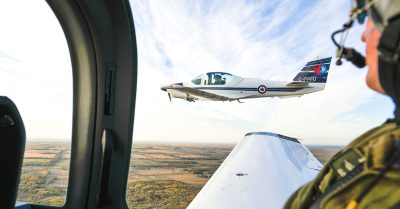
Federal Defence minister Bill Blair announced on Wednesday (May 29) the awarding of a 25-year contract valued at $11.2 billion that will see the acquisition of 71 training aircraft of various types for the RCAF. The contract, which is to begin in 2029, was awarded to SkyAlyne Canada Limited, a partnership between KF Aerospace of Kelowna, British Columbia and CAE of Montreal. The partnership was formed in response to the federal government’s desire to consolidate various flight training related contracts into a single contract as per their previously announced Future Aircrew Training (FAcT) program.
The new training fleet composition will include:
- 23 Grob G120TP single-engine turboprop airplanes for basic training
- 19 Pilatus PC-21 single-engine turboprop airplanes for advanced training
- 7 Beechcraft King Air 260 turboprop airplanes for advanced twin-engine training
- 3 De Havilland Canada Dash 8-Q400 airplanes for advanced training of airborne mission systems operators.
- 19 Airbus H135 light turbo-shaft helicopters for rotary training
“Today’s investments demonstrate that when we work collaboratively with Canadian industry partners, we can provide our troops with the tools that they need to do their jobs – and support good jobs right across Canada,” Blair said.
However, conspicuous by their absence were replacement aircraft for the recently retired fleet of 17 BAe CT-155 Hawk advanced jet training aircraft. The federal government said it would find a NATO ally to which the RCAF can send their pilots to complete the final phase of training before they can be cut loose on the fighter fleet, expected by that time to be composed of F-35 Lightning fifth-generation fighters. Foreign countries that have reportedly been approached for final-phase training include Italy, Finland and the United States.
“We must modernise our training systems as we are modernising our front-line equipment and weapons systems to ensure Royal Canadian Air Force personnel can operate and win in highly contested and increasingly complex theatres of operation, said RCAF commander Lieutenant-General Eric Kenny.
